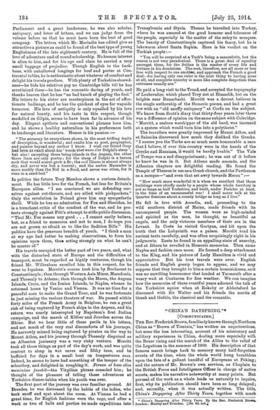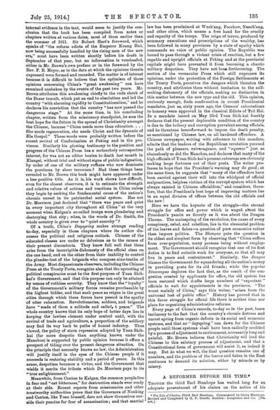"CHINA'S DAYSPRING."
[COMMUNICATED.]
THE Rev. Frederick Brown, familiarly known through Northern China as "Brown of Tientsin," has written an unpretentious, but none the less interesting, account of his missionary and military experiences in China, dealing more especially with the Boxer rising and the march of the Allies to the relief of the Legations in the summer of 1900. His description of that famous march brings back to memory many half-forgotten events of the time, when the whole world hung breathless upon the fate of a gallant handful of Europeans at Peking; and the nature of Mr. Brown's own services, as Chaplain to the British Force and Intelligence Officer in charge of native scouts, makes his narrative noteworthy at many points. But perusal of the work as a whole leads us naturally to inquire, first, why its publication should have been so long delayed; and, secondly, when it was actually written. The title, China's Dayspring After Thirty Years, together with much
• China's Dayspring After Thirty Years. By the Her. Frederick Brawny London : Murray and Brendan. [108. 6d. not,i
internal evidence in the text, would seem to justify the con- clusion that the book has been compiled from notes or chapters written at various dates, most of them earlier than the summer of 1911. Sir Robert Hart's foreword, which speaks of "the reform edicts of the Emperor Kuang Hsu, now being successfully handled by the rising men of the new era," must have been written shortly before his death in September of that year, but no information is vouchsafed, either in Mr. Brown's own preface or in the foreword by the Rev. F. B. Meyer, as to the date at which the opinions therein expressed were formed and recorded. The matter is of interest because it is difficult to believe that the optimism of these opinions concerning China's "great awakening" can have remained unshaken by the events of the past two years. Mr. Brown attributes this awakening chiefly to the rude shock of the Boxer tumult, which put an end to absolutism and led the country "with alarming rapidity to Constitutionalism," and he declares his conviction that the country "has now passed the dangerous stage." At the same time, in his concluding chapter, written from the missionary standpoint, he sees the best hope for the future in the spread of Christianity amongst the Chinese, because "China needs more than education. . . . She needs regeneration, she needs Christ and the dynamic of His Gospel." These worda were probably written before the recent revival of Confucianism at Peking and in the pro- vinces. Similarly his glowing testimony to the position and progress of the Chinese Press has a melancholy retrospective interest, for was not an editor beaten to death last month in Kiangsi, without trial and without signs of public indignation, by order of one of the military ruffians who now dominate the provinces by sheer terrorism ? Had these things been revealed to Mr. Brown this book might have appeared under a less positive title. As it is, his work shows how difficult, even for the closest observers, it is to estimate the strength and relative values of actions and reactions in China unless they begin by seeking the fundamental cause of the nation's chronic unrest in its patriarchal social system. HilE3 not Dr. Morrison just declared that "there was peace and quiet in every important city throughout all China" at the very 'moment when Kalgan'e so-called troops were plundering and destroying that city ; when, in the words of Dr. Smith, the whole country is given over to "quiet anarchy"?
Of a truth, China's Dayspring makes strange reading to-day, especially in those chapters where its author dis- cusses the political and religious outlook. Chinese of the educated classes are under no delusions as to the causes of their present discontents. They know full well that these arise from the incorrigible dishonesty of the official class on the one hand, and on the other from their inability to control the plunder-lust of the brigands who compose nine-tenths of the Army. Most dispassionate observers, including the Chinese Press at the Treaty Ports, recognize also that the uprooting of political conspiracies must be the first purpose of Yuan Shih- kers Government, and that this purpose can only be attained by means of ruthless severity. They know that the "loyalty" of the Government's military forces remains purchasable by the highest bidder, and that such peace as reigns in the great cities through which these forces have passed is the apathy of utter exhaustion. Revolutionaries, soldiers, and brigands have "made of them a solitude and called, t peace." The whole country knows that its only hope of better days lies in keeping the lawless element under control until, with the revival of trade and agriculture, a proportion of the soldiery ruay find its way back to paths of honest industry. Thus viewed, the policy of stern repression adopted by Yuan Shih- kai (far more despotic than anything known under the Manchus) is supported by public opinion because it offers a prospect of tiding over the present dangerous situation. On the principle that necessity knows no law, the Administration will justify itself in the eyes of the Chinese people if it succeeds in restoring stability and a period of peace. In this sense, despotism becomes a virtue, and the Government that wields it merits the tribute which Dr. Morrison pays to its 1" true enlightenment."
Meanwhile, from Canton to Kalgan, the common people live in fear and "eat bitterness," for destruction stands ever ready at their side. Recent reports from missionaries and other trustworthy authorities prove that the Governors of Nanking and Canton, like Yuan himself, dare not show themselves out- side their yamens for fear of assassination; and that martial
law has been proclaimed at Wuch'ang, Foochow, Nanch'ang, and other cities, which means a free hand for the cruelty and rapacity of the troops. The reign of terror, produced by summary executions and proscriptions of the wealthy, has been followed in many provinces by a state of apathy which commands no voice of public opinion. The Republic was bound to pass through a violent crisis of reaction, but a few capable and upright officials at Peking and at the provincial capitals might have prevented it from becoming a chaotic military despotism. They have not bees forthcoming. The section of the vernacular Press which still expresses its opinions, under the protection of the Foreign Settlements at the Treaty Ports, perceives the dangers which threaten the country, and attributes them without hesitation to the self- seeking dishonesty of the officials, making no distinction in this matter between the new type and the old. This opinion, curiously enough, finds confirmation in recent Presidential mandates, just as, sixty years ago, the Censors' exhortations to honesty were approved in the classical Edicts of Tzii Hsi. In a mandate issued on May 23rd Yuan Shih-kai frankly declares that the present deplorable condition of the country is due to the bribery and corruption prevalent among officials, and he threatens henceforward to impose the death penalty, as sanctioned by Chinese law, on all hardened offenders. A Chinese newspaper, writing with reference to this mandate, admits that the leaders of the Republican revolution pursued the path of pleasure, extravagance, and " squeeze " just as shamelessly as did the Manchus, and declares that many of the high officials of Yuan Shih-kai's present entourage are obviously making large fortunes out of their posts. The writer pro- fesses to hope that the President's warning may do good ; at the same time, he suggests that "many of the offenders have been carried against their will into the whirlpool of official malpractices, helpless victims of the corrupt system which has always existed in Chinese officialdom," and considers, there- fore, that the President's best hope of improving matters lies in an equal division of offices between the old officials and the new !
Here we have the keynote of the struggle—the eternal struggle for office and power which is waged about the President's yamen as fiercely as it was about the Dragon Throne. The mainspring of the revolution, the cause of every conspiracy, cabal, and rebellion, lies in the elemental problem of the loaves and fishes—a question of pure economics rather than impure politics. The Shenpao puts the question in its oldest and simplest form by observing that "China suffers from over-population, many persons being without employ- ment. The Government should recognize that one of its first duties is to find suitable work for everyone, so that all may live in peace and contentment." Similarly, the Sunpao blames the Government for squandering all the nation's money in providing posts for its old friends ; while the popular Sinwanpao deplores the fact that, as the result of the con- gestion created by applicants for office, the old system has been restored which drafts large numbers of "expectant" officials to wait for appointments in the provinces. "The worst malady of China," says this writer, "arises from the universal lust of public office." History has proved that in this fierce struggle for official life there is neither time nor place for organizing administrative reforms.
Every page of China's records, to-day as in the past, bears testimony to the fact that the country's chronic distress and unrest spring from organic defects in its social and economic systems, and that no " dayspring" can dawn for the Chinese people until those systems shall have been radically modified by a process of adjustment to environment, necessarily long and painful. Mr. Brown believes that Christianity will lead the Chinese to this salutary process of adjustment, and that a Constitutional form of government will assist it, as indeed it may. But do what we will, the final question remains one 01 numbers, and the problem of the loaves and fishes in the East continues to demand its solution, either by miracle or by misery.







































 Previous page
Previous page